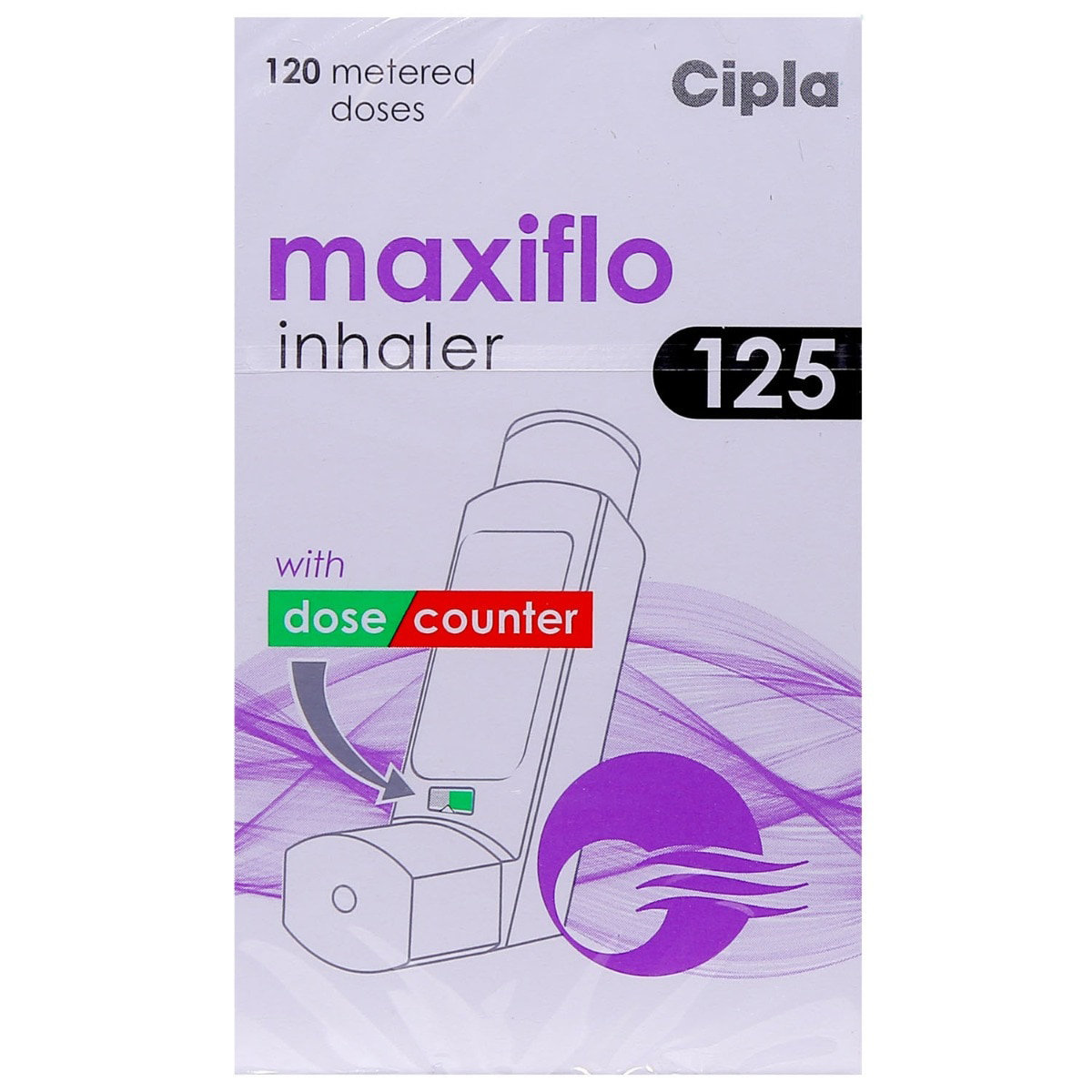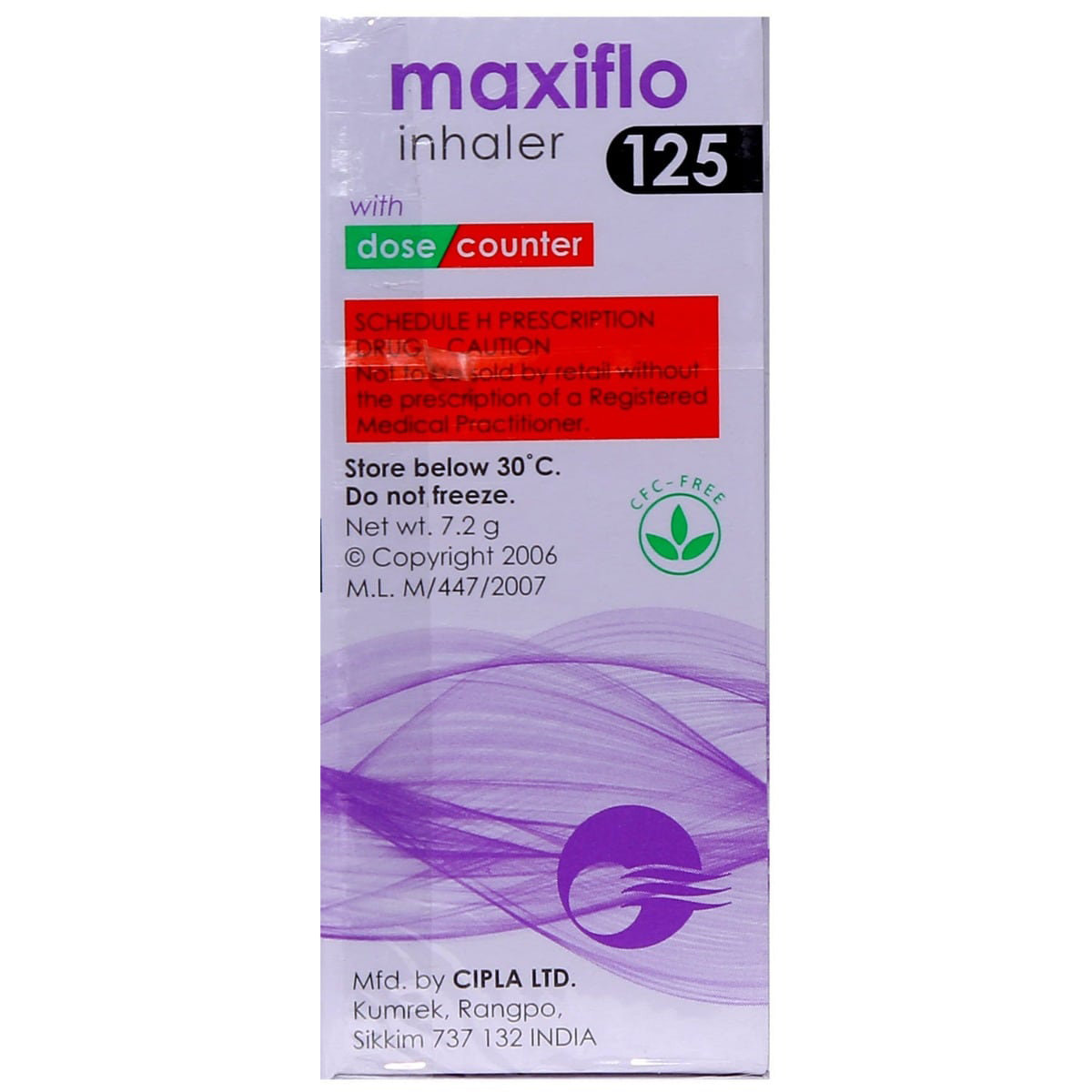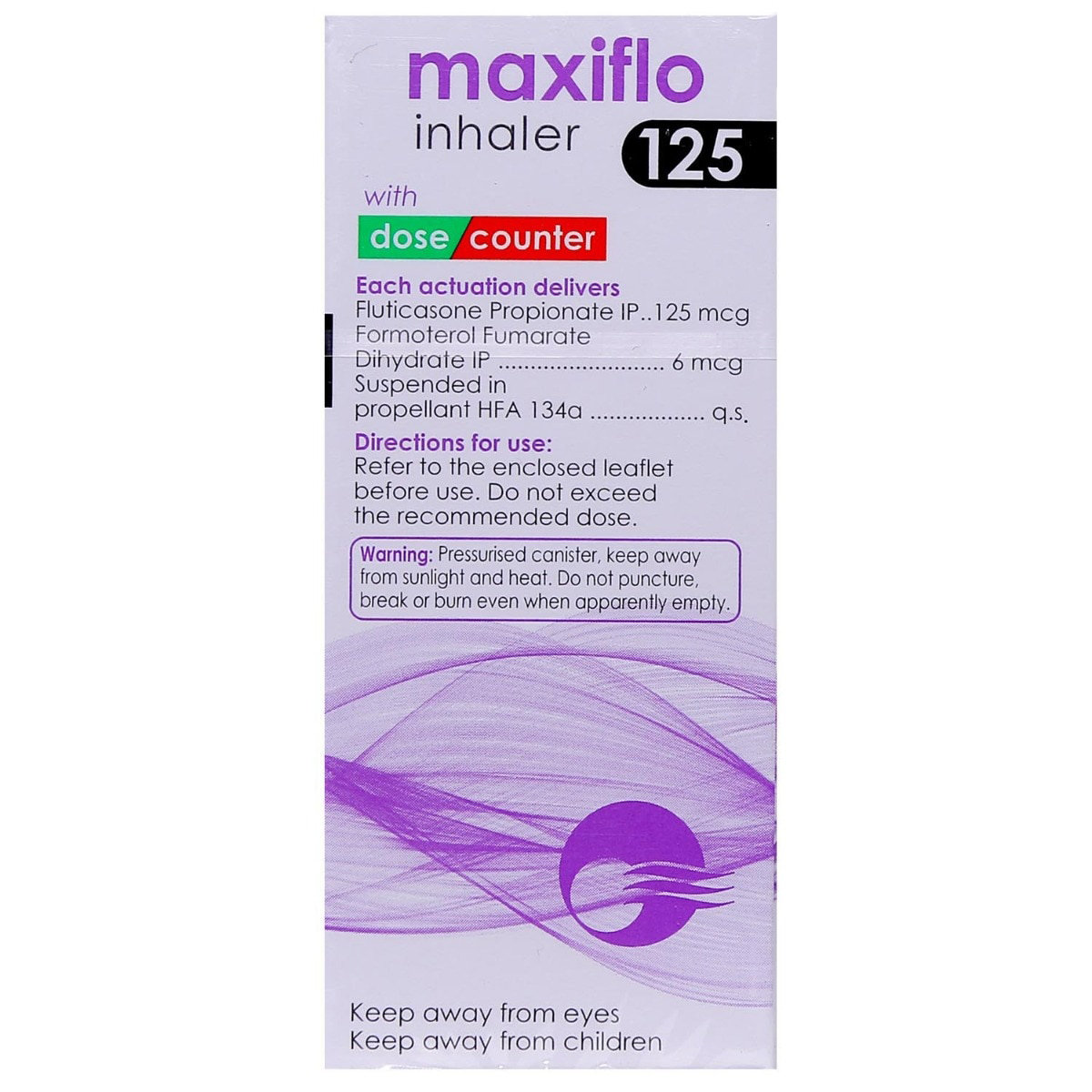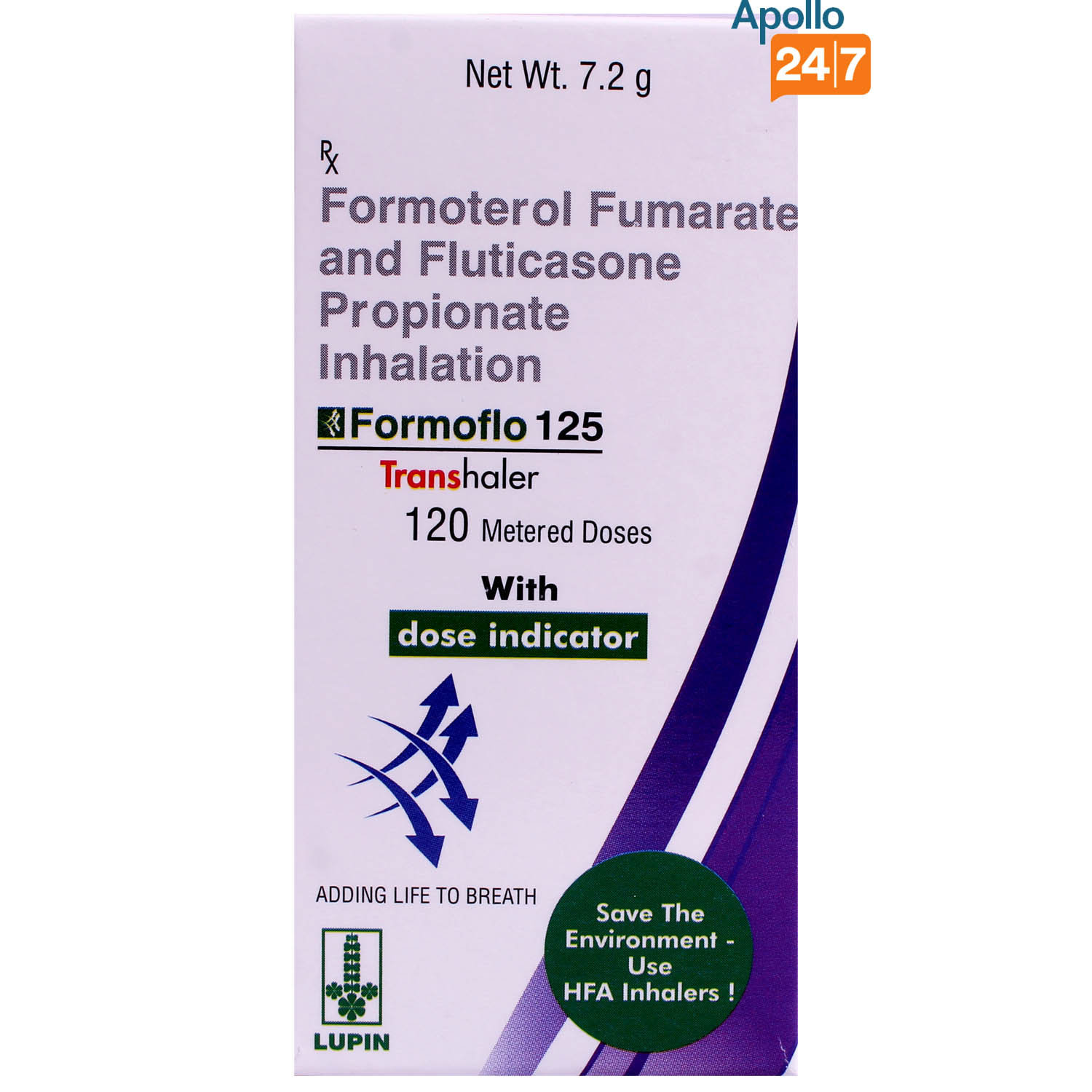Maxiflo 125 Inhaler 120 mdi
MRP ₹627
(Inclusive of all Taxes)
₹94.0 Cashback (15%)
Provide Delivery Location
Online payment accepted
 Prescription drug
Prescription drugWhats That
Manufacturer/Marketer :
Consume Type :
Expires on or after :
Return Policy :
About Maxiflo 125 Inhaler 120 mdi
Maxiflo 125 Inhaler 120 mdi is a combination medication primarily used to treat and prevent asthma and chronic obstructive pulmonary disease (COPD). Asthma is a chronic (long-term) respiratory condition in which airways narrow, swell and produce extra mucus, leading to difficulty breathing. COPD is a group of lung diseases with emphysema (shortness of breath) and chronic bronchitis (inflammation of the lining of bronchial tubes).
Maxiflo 125 Inhaler 120 mdi is a combination of two medicines, namely: Formoterol fumarate (bronchodilator) and Fluticasone propionate (corticosteroids). Formoterol fumarate is a long-acting beta-agonist that relaxes the muscles in the airways and increases airflow to the lungs. Thereby making breathing easier by widening the airways. Fluticasone propionate acts by blocking prostaglandin's production (chemical messengers) that cause inflammation (swelling) of the airways. Thereby, it provides relief from sneezing, runny or blocked nose and sinus discomfort.
Use Maxiflo 125 Inhaler 120 mdi as advised by the doctor. Your doctor will decide the dose and duration based on your medical condition. The common side effects of Maxiflo 125 Inhaler 120 mdi include nausea, vomiting, respiratory tract infection, headache, sore throat, cough, bone, muscle or joint pain, increased heart rate, chills, tiredness and noisy breathing. Most of these side effects of Maxiflo 125 Inhaler 120 mdi do not require medical attention and gradually resolve over time. However, if the side effects are persistent, reach out to your doctor.
Do not use Maxiflo 125 Inhaler 120 mdi to treat sudden severe asthma symptoms or as a rescue inhaler. Please check with your doctor if you are pregnant, currently breastfeeding or taking any other prescribed or non-prescribed medicines. Maxiflo 125 Inhaler 120 mdi is not recommended for children below five years of age. If you experience severe difficulty in breathing, please consult a doctor immediately so that alternative medicine may be prescribed. Regular monitoring of potassium levels is recommended while taking Maxiflo 125 Inhaler 120 mdi as it may cause low potassium levels in the blood.
Uses of Maxiflo 125 Inhaler 120 mdi
Directions for Use
Key Benefits
Maxiflo 125 Inhaler 120 mdi is used to treat and prevent respiratory disorders like asthma and chronic obstructive pulmonary disease (COPD). Maxiflo 125 Inhaler 120 mdi improves pulmonary function and effectively treats and prevents the worsening of emphysema (shortness of breath) and chronic bronchitis (inflammation of the lining of your bronchial tubes). Maxiflo 125 Inhaler 120 mdi is a combination of Formoterol fumarate and Fluticasone propionate. Formoterol fumarate is a long-acting β₂ agonist and bronchodilator. It relaxes the muscles in the airways and increases airflow to the lungs. It makes breathing easier by widening the airways. Fluticasone propionate belongs to the class of corticosteroids. It acts by blocking prostaglandin's production (chemical messengers) that cause inflammation (swelling) of the airways. Together, Maxiflo 125 Inhaler 120 mdi helps treat asthma and COPD.
Storage
Drug Warnings
Do not stop taking this medicine of your own unless advised by your doctor. Before taking Maxiflo 125 Inhaler 120 mdi, let your doctor know if you have a history of heart, liver, kidney diseases, high blood pressure, hypokalaemia (low potassium levels in the blood), aneurysm (swelling of an artery), pheochromocytoma (adrenal gland tumour), hyperadrenocorticism (high levels of cortisol), eye disorders like cataract and glaucoma, chickenpox or measles, immune system problem, seizure (fits), osteoporosis (weak and brittle bones) and diabetes. Maxiflo 125 Inhaler 120 mdi may cause hypokalemia (low potassium levels in the blood). Therefore they should be used with caution in patients with hypokalaemia to prevent any cardiovascular effects. Special precautions should be taken in patients with a fungal, bacterial, parasitic, or viral infection and tuberculosis since nasal or inhaled corticosteroids like Fluticasone propionate can cause secondary infections. Maxiflo 125 Inhaler 120 mdi can cause a rise in blood glucose levels. Hence monitor your blood glucose levels regularly and inform your doctor if you already have diabetes before using Maxiflo 125 Inhaler 120 mdi. Please let your doctor know if you are pregnant or breastfeeding. Maxiflo 125 Inhaler 120 mdi is not recommended for children below five years of age.
Drug-Drug Interactions
Drug-Drug Interactions
Login/Sign Up
Co-administration of Maxiflo 125 Inhaler 120 mdi with Mifepristone may make Maxiflo 125 Inhaler 120 mdi less effective as a therapy.
How to manage the interaction:
Taking Maxiflo 125 Inhaler 120 mdi with Mifepristone is not recommended, consult a doctor before taking it. Do not stop using any medications without talking to a doctor.
Co-administration of Atazanavir and Maxiflo 125 Inhaler 120 mdi may significantly increase the absorption of Maxiflo 125 Inhaler 120 mdi into the bloodstream.
How to manage the interaction:
Co-administration of Atazanavir and Maxiflo 125 Inhaler 120 mdi can lead to an interaction, it can be taken if advised by a doctor. However, if you experience any symptoms like swelling, weight gain, high blood pressure, high blood glucose, muscle weakness, depression, acne, thinning skin, stretch marks, easy bruising, bone density loss, cataracts, menstrual irregularities, excessive growth of facial or body hair, and abnormal distribution of body fat, especially in the face, neck, back, and waist, consult a doctor immediately. Do not stop using any medications without a doctor's advice.
Co-administration of Boceprevir with Maxiflo 125 Inhaler 120 mdi may significantly increase the absorption of Maxiflo 125 Inhaler 120 mdi into the bloodstream.
How to manage the interaction:
Co-administration of Boceprevir and Maxiflo 125 Inhaler 120 mdi can lead to an interaction, it can be taken if advised by a doctor. However, if you experience any symptoms like swelling, weight gain, high blood pressure, muscle weakness, depression, acne, thinning skin, stretch marks, easy bruising, bone density loss, menstrual irregularities, excessive growth of facial or body hair, and abnormal distribution of body fat, especially in the face, neck, back, and waist, consult a doctor immediately. Do not stop using any medications without a doctor's advice.
Co-administration of Troleandomycin may significantly increase the absorption of Maxiflo 125 Inhaler 120 mdi and tend to increase the risk of side effects.
How to manage the interaction:
There may be a possibility of interaction between Maxiflo 125 Inhaler 120 mdi and Troleandomycin, but it can be taken if prescribed by a doctor. If you notice any of these symptoms - swelling, weight gain, high blood pressure, high blood sugar, muscle weakness, feeling down, acne, thinning skin, bruises, changes in your period, too much facial or body hair, unusual fat distribution, infection, injury, or a bad asthma attack - make sure to call a doctor right away. Do not discontinue any medications without consulting a doctor.
Co-administration of Dinutuximab and Maxiflo 125 Inhaler 120 mdi may increase the risk of serious and potentially infections.
How to manage the interaction:
Co-administration of Dinutuximab and Maxiflo 125 Inhaler 120 mdi can lead to an interaction, it can be taken if advised by a doctor. However, if you experience any symptoms like fever, chills, diarrhea, sore throat, muscle aches, shortness of breath, blood in phlegm, weight loss, red or inflamed skin, body sores, and pain or burning during urination, consult a doctor immediately. Do not stop using any medications without a doctor's advice.
Co-administration of Ketoconazole and Maxiflo 125 Inhaler 120 mdi may significantly increase the absorption of Maxiflo 125 Inhaler 120 mdi into the bloodstream.
How to manage the interaction:
If you are supposed to take Maxiflo 125 Inhaler 120 mdi and Ketoconazole together, doctor may adjust the dose or monitor you more frequently to use both medications safely. However, if you experience side effects such as weight gain, high blood pressure, swelling, muscle weakness, acne, depression, thinning skin, easy bruising, stretch marks, bone density loss, cataracts, menstrual irregularities, excessive growth of facial or body hair, and abnormal distribution of body fat, especially in the face, neck, back, and waist, contact a doctor. Do not discontinue the medication without consulting a doctor.
Co-administration of Nefazodone may significantly increase the absorption of Maxiflo 125 Inhaler 120 mdi into the bloodstream.
How to manage the interaction:
Co-administration of Maxiflo 125 Inhaler 120 mdi with Nefazodone can possibly result in an interaction, but it can be taken if a doctor has advised it. A doctor can recommend other options that won't cause any problems when taken together. Do not stop using any medications without talking to a doctor.
Co-administration of Maxiflo 125 Inhaler 120 mdi with posaconazole may increase the level of Maxiflo 125 Inhaler 120 mdi in the blood and increase the risk of side effects.
How to manage the interaction:
Although there is an interaction between Maxiflo 125 Inhaler 120 mdi and posaconazole, they can be taken together if prescribed by a doctor. However, if you experience muscle weakness, acne, thinning skin, easy bruising, stretch marks, menstrual irregularities, excessive growth of facial or body hair, and abnormal distribution of body fat, especially in the face, neck, back, and waist, contact a doctor. Do not discontinue the medication without consulting a doctor.
Co-administration of Mibefradil may significantly increase the absorption of Maxiflo 125 Inhaler 120 mdi into the bloodstream.
How to manage the interaction:
Taking Maxiflo 125 Inhaler 120 mdi with Mibefradil together can possibly result in an interaction, but it can be taken if a doctor has advised it. If you notice any of these symptoms - swelling, weight gain, high blood pressure, high blood sugar, weak muscles, feeling down, acne, thinning skin, easy bruising, irregular periods, too much facial or body hair, unusual fat distribution, infection, injury, or a bad asthma attack - make sure to call a doctor right away. Do not stop using any medications without talking to a doctor.
When Conivaptan is taken with Maxiflo 125 Inhaler 120 mdi, it can make Conivaptan break down faster in the body.
How to manage the interaction:
Co-administration of Conivaptan and Maxiflo 125 Inhaler 120 mdi can lead to an interaction, it can be taken if advised by a doctor. However, if you experience any symptoms like swelling, weight gain, high blood pressure, high blood glucose, muscle weakness, depression, acne, thinning skin, stretch marks, easy bruising, bone density loss, menstrual irregularities, excessive growth of facial or body hair, and abnormal distribution of body fat, especially in the face, neck, back, and waist, consult a doctor immediately. Do not stop using any medications without a doctor's advice.
Drug-Food Interactions
Drug-Food Interactions
Login/Sign Up
Diet & Lifestyle Advise
- Take the medication as directed by the doctor and at regular intervals. Do not use other over-the-counter medicines, herbal or vitamin supplements without informing your pharmacist or doctor when you take Maxiflo 125 Inhaler 120 mdi.
- Know your triggers like allergens, such as pollen, dust and food items that make your asthma severe.
- Quit smoking and avoid passive smoking. Smoking also reduces the effectiveness of the medicine.
- Eat a healthy diet and exercise regularly to strengthen your breathing muscles and boost your immune system.
- Learning breathing exercises will help you move more air in and out of your lungs.
Side Effects of Maxiflo 125 Inhaler 120 mdi
- Nausea
- Vomiting
- Respiratory tract infection
- Headache
- Sore throat
- Cough
- Bone, muscle or joint pain
- Increased heart rate
- Chills
- Tiredness
- Noisy breathing
Habit Forming
Therapeutic Class
All Substitutes & Brand Comparisons
RX
Formoflo 125 Transhaler 7.2 gm
Lupin Ltd
₹653.5
(₹4.9/ 1MDI)
4% COSTLIERRX
Formoprl-F 125 Inhaler 7.2 gm
Pristine Pearl Pharma Pvt Ltd
₹570
(₹79.17/ 1gm)
1584% COSTLIER
Author Details
We provide you with authentic, trustworthy and relevant information
Drug-Diseases Interactions
Drug-Diseases Interactions
Login/Sign Up
FAQs
Drug-Drug Interactions Checker List
- FUROSEMIDE
- BUDESONIDE
- MOMETASONE
- BECLOMETHASONE
- VILANTEROL
- SALMETEROL
- ALBUTEROL
- IPRATROPIUM
- SOTALOL
- METOPROLOL
Special Advise
- It is advised to undergo a blood examination to check your potassium levels since Maxiflo 125 Inhaler 120 mdi can cause low potassium levels in the blood (hypokalaemia).
- Regularly monitor your blood sugar levels while using Maxiflo 125 Inhaler 120 mdi since bronchodilators like Formoterol fumarate can cause low blood glucose levels.
- Consult your diabetologist if you have diabetes before using Maxiflo 125 Inhaler 120 mdi so that your insulin or other diabetic medication doses can be adjusted accordingly to maintain your blood sugar levels.
Disease/Condition Glossary
Asthma: It is a chronic (long-term) respiratory condition in which airways narrow, swell, and produce extra mucus, leading to difficulty in breathing. The symptoms of asthma include wheezing (whistling sound while breathing), shortness of breath, chest tightness and cough, especially at night. The treatment for asthma includes medication, breathing exercises and self-care.
Chronic obstructive pulmonary disease (COPD): It is a group of lung diseases with emphysema (shortness of breath) and chronic bronchitis (inflammation of the lining of bronchial tubes). The major cause of COPD is smoking tobacco. Also, long-term exposure to fumes and chemicals may lead to COPD. The symptoms include chronic cough, shortness of breath or wheezing (whistle sound while breathing).

Have a query?
Alcohol
Safe if prescribed
Avoid drinking alcohol while taking this medicine as it can worsen your side effects.
Pregnancy
Consult your doctor
Please consult your doctor if you plan to conceive or are already pregnant before starting Maxiflo 125 Inhaler 120 mdi.
Breast Feeding
Consult your doctor
It is not known if this drug passes into breast milk. Consult your doctor before breastfeeding.
Driving
Safe if prescribed
Maxiflo 125 Inhaler 120 mdi is unlikely to affect your ability to drive.
Liver
Consult your doctor
Let your doctor know if you have any history of liver diseases or hepatic impairment. Your doctor will weigh the benefits and potential risks before prescribing Maxiflo 125 Inhaler 120 mdi.
Kidney
Consult your doctor
Let your doctor know if you have any history of kidney diseases. Your doctor will weigh the benefits and potential risks before prescribing Maxiflo 125 Inhaler 120 mdi.
Children
Safe if prescribed
Maxiflo 125 Inhaler 120 mdi is not recommended for use in children less than five years of age. The dose may have to be adjusted by your doctor depending upon the condition and age of the child.














_0.jpg?tr=q-85)
